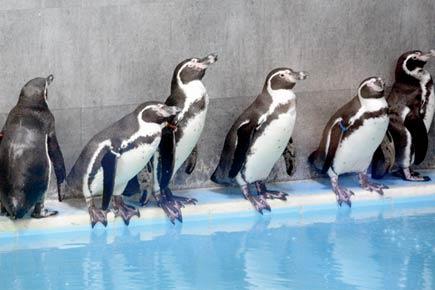Seven endangered Humboldt Penguins, imported from an aquarium in Seoul last July, will finally go on public display at the Mumbai Zoo in Mumbai. A new controversy has erupted over their names

 Humboldt Penguins
Humboldt Penguins
ADVERTISEMENT
Seven endangered Humboldt Penguins, imported from an aquarium in Seoul last July, will finally go on public display at the Mumbai Zoo in Mumbai on Friday evening -- amidst a controversy over their names.
The Brihanmumbai Municipal Corporation (BMC) had imported eight Humboldts from Coex Aquarium for around Rs 2 crore, of which one died on October 23, 2016, following an infection, sparking off a major political row.
Most major political parties demanded that they should be sent back as their lives could be at risk in Mumbai's hot, tropical climate.
Now a new controversy has erupted over their names.
"The BMC has named the Penguins as 'Donald, Daisy, Olive, Popeye, Bubble, Flipper and Mr Molt' -- We strongly protest at these Western names and demand that they should be renamed with good Indian names," Pravin Chheda, Congress's ex-BMC Leader of Opposition told IANS.
These Humboldt Penguins belong to the South American species found in the icy cold coasts of Chile and Peru.
Owing to a steep decline in their population, this species has been listed since 2000 as 'vulnerable' in the Red List of the International Union for Conservation of Nature (IUCN), Switzerland.
Shiv Sena President Uddhav Thackeray will inaugurate the specially-chilled enclosure in the zoo where the seven flightless birds -- that have been given "Western" names, including those of cartoon characters -- would go on display for the first time in the country.
Considered a brainchild of Yuva Sena chief Aditya U. Thackeray, the Humboldt Penguins are part of an ambitious Rs 2.5 crore modernisation plan of the Veermata Jijabai Bhosale Udyan or Mumbai Zoo.
These Humboldts are black-and-white penguins with a black head and white border running from the eyes around the ears and chins and joining at the throat, blackish-grey upper parts, whitish underparts with black breast-bands extending to the thighs, and a fleshy-pink base to the bill.
They were quarantined in a special enclosure for the past nearly eight months to acclimatise them to Indian conditions and the change of location.
These penguins can withstand temperatures of between four to 24 degrees Celsius and the quarantine areas will provide this controlled air-conditioned temperature while on display.
 Subscribe today by clicking the link and stay updated with the latest news!" Click here!
Subscribe today by clicking the link and stay updated with the latest news!" Click here!






